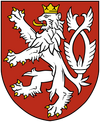| Henry II of Bohemia | |
|---|---|

| |
| Henry of Prague | |
| King of Bohemia | |
| Reign | 3rd February, 1540 - 15th September, 1550 |
| Predecessor | Wenceslaus V |
| Successor | Maximilian I |
| Born | 10th October, 1537 Prague, Bohemia |
| Died | 15th September, 1550 Bechyně, Bohemia |
| House | Luxembourg-Limburg |
| Father | Wenceslaus V |
| Mother | Amalia of Poland |
The only surviving son of Wenceslaus II (V), Henry (II) of Prague would never get to rule the various Luxembourg lands.
Only two years of age on his father's death only Bohemia immediately crowned him. Elsewhere, whilst he was accepted as the legitimate heir, his elder half-sister Joanna ruled in his stead as regent. One of Luxembourg's seemingly endless illegitimate scions, the elderly and childless Jobst Sigismund, Margrave of Mělník, was appointed by the Prague Diet as Bohemia's governor and Joanna was simply told to accept the decision.
Bohemia at this time was religiously fractured, the old fault lines of Catholic versus Hussites was joined by the growth of Lutheranism, especially in the towns. The old magnates sought to disenfranchise these new Lutherans from wielding any power and an inordinate amount of political capital was sapped to prevent Lutheran mayors being elected in various towns. Jobst Sigismund attempted to use the religious power struggle for the Crown's ends; namely to prise the right of election out of the Prague Diet's hands but ended up outmaneouvred. He would keep his job but would hand even more power to the divided but functioning Diet.
In 1544 Bohemia was thrust into a war with Poland following the death of Count Philip IV of Nassau. Henry was certainly one of the obvious heirs to Nassau, however the young Prince Sigismund of Poland had a good claim too. Poland under Anna I geared up for war believing they had the stronger claim. Neither in theory could inherit the county thanks to Salian Law but that little technicality would not prevent the two realms from testing their strength against each other. Luxembourg and Poland therefore found themselves at war before Prague really had time to react.
Nassau itself fell quickly to Luxembourg's Western army, the Catholic-leaning nobles quickly pledging their fealty to Joanna and Henry of Prague. By the Spring of 1545 the attempted re-conversion of Nassau's populace to Catholicism was underway. In the East however the Polish-Lithuanian armies ran rampant over Brandenburg and Bohemia whilst capturing several important fortresses in Hungary. The Brandenburg forces would eventually provide a coherent defence but in Bohemia and Hungary the generals could not organise themselves or their troops effectively. Many of the more competent Bohemian generals had sided with Jobst Sigismund during his attempt to prise powers back to the crown and hence had been demoted in the Diet's general purging of his allies. It would only be a resumption of war with Tver that made Poland withdraw.
This victory added Nassau to Luxembourg's western holdings, and Nassau appeared ready to hand him the comital crown early (until Joanna's agents made them back down), but the war proved disastrous for the eastern kingdoms. Hungary seethed with disaffection, not due to only the apparent lack of support its armies received in the war but also Joanna's concentration on Germany and Bohemia; where was the assistance for its Italian ambitions? Bohemia meanwhile looked at the instant crackdown on Lutherans and other protestant groups in Nassau which followed its absorption and feared for what might happen to its own religious tolerance.
Charged with putting her own interests above Henry's, Joanna was reconciled to her half-bother and the critical Prague Diet in 1547 when she made an almost penitential visit, reconfirming her fealty. This supposed goodwill disappated soon after as the two courts began simultaneously searching for an appropriate queen for Henry. The Prague Diet looked locally favouring an Austrian marriage or, failing that, a Polish marriage which would soothe relations and potentially lead to a growth of the Bohemian crown. Joanna's court in far-off Antwerp was thinking more of the wider strategic picture, talking to Castile, Tver and Portugal for a match. This refusal to see eye to eye got worse in 1548 after the death of Jobst Sigismund as the question of who would gain his now empty Margravate and who would act as Regent for the still underage king consumed the kingdom. Worse was to come.
Henry would fall ill and died in September 1550 throwing the Luxembourg realm into a spasm of uncertainty. While the other parts of the Luxembourg realm came to accept Queen-Regent Joanna's son Henry of Ghent as rightful heir Bohemia saw its chance to shrug off Luxembourg rule. Without an incumbent Luxembourg scion overseeing them the Diet announced their intention to tender the crown out to the best candidate. Soon a great many of the magnates were in the pocket of Austrian agents and Archduke Maximilian II declared king, the remaining Luxembourg loyalists exiled. Seeking to punish Luxembourg for Joanna's refusal to help during the First Schmalkaldic War (and for their much-earlier seizure of Holland from the Wittelsbach family), Emperor Charles V ratified the switch of dynasties.
| |||||||||||||||||||||||||||||||
| ||||||||||||||||||||


